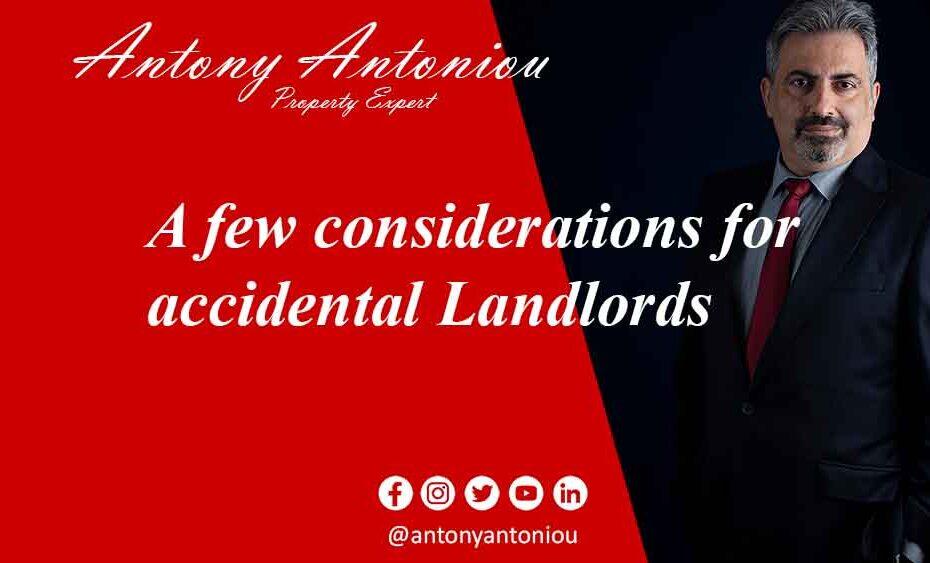A few considerations for accidental Landlords
**Accidentally Became a Landlord? Here’s What You Need to Know**
*Analysis of Investors’ Options as the Housing Market Slows and Rents Soar*
In recent months, the UK housing market has seen a significant shift, with house prices beginning to drop and rents soaring. As a result, an interesting trend has emerged – the rise of “accidental” landlords. These are homeowners who, unable to sell their properties at desired prices, have opted to rent them out until market conditions improve. This phenomenon has been fueled by the slowdown in property sales and the high demand for rental properties.
The accidental landlord scenario is prevalent among those who purchased their properties in the last five years. Some have seen inadequate property value growth, while others have faced rising mortgage costs, leaving them reluctant to sell at a loss. Rent prices have surged to a point where the risk of having an empty rental property is currently at its lowest in a decade.
There are two segments in the rental market – the mass market, with rents up to £1,000 a week, and the prime market, where landlords can command even higher rents. The prime market has seen a notable increase in accidental landlords, mainly because these homeowners can afford to hold onto their properties until they secure their desired price.
Other situations leading to accidental landlords include couples moving into shared properties and renting out the other portion or inheriting properties from deceased family members. The average tenancy length has extended to 22 months, giving new landlords nearly two years to wait for property values to recover before reassessing the market.
**Key Considerations for Accidental Landlords**
If you’ve unexpectedly found yourself in the position of a landlord, there are several crucial aspects you should be aware of:
1. **Tax Implications:**
Becoming a landlord may entail losing certain tax benefits, such as stamp duty relief. When you rent out a property, you’ll need to pay income tax on the profits, along with capital gains tax when you eventually sell the property. The capital gains tax rates are 18% for basic-rate taxpayers and 28% for higher-rate taxpayers.
2. **Incorporation Options:**
Many landlords have started transferring property ownership to limited companies due to the advantages they offer in terms of tax relief on mortgage costs. While this option can be beneficial for landlords with multiple properties, it may not be cost-effective for those with just one property.
3. **Investing in the Property:**
To maintain or increase property value, landlords should invest in their rental properties. Improvements like kitchen renovations or energy-efficient retrofits can enhance the property’s appeal and attract tenants or future buyers.
4. **Protecting the Deposit:**
Accidental landlords should ensure they properly protect tenants’ deposits by placing them in a government-approved deposit protection scheme. Failing to do so can lead to compensation claims for up to three times the deposit amount.
5. **Setting Clear Terms:**
Establishing clear and agreed-upon terms at the beginning of the tenancy is vital, even in family or friend situations. Putting these terms in writing can prevent potential legal disputes down the line.
6. **Stay Informed about Renters’ Rights:**
The government is planning to introduce the Renters Reform Bill, which aims to enhance tenants’ rights in the private rental sector. As a landlord, being aware of the proposed changes is essential to comply with new regulations.
Becoming an accidental landlord can be a challenging situation, but with the right knowledge and preparation, it can also be a rewarding venture. Whether you choose to embrace the role temporarily or as a long-term investment, staying informed and being proactive will contribute to a successful landlord experience. Remember, the rental market is ever-changing, and understanding the dynamics will help you make informed decisions for your property and tenants.
Summary
– The UK housing market has slowed, leading to a rise in “accidental” landlords.
– Homeowners are renting out their properties due to dropping house prices and soaring rents.
– Accidental landlords include those unable to sell at desired prices or who inherited properties.
– The prime rental market has seen a significant increase in accidental landlords.
– Tax implications for landlords include income tax on profits and capital gains tax on property sales.
– Some landlords are incorporating properties to benefit from tax relief on mortgage costs.
– Investing in the property can maintain or increase its value over time.
– Protecting tenants’ deposits is crucial to avoid potential compensation claims.
– Clearly defining terms with tenants, even in family or friend scenarios, helps avoid legal disputes.
– Landlords should be aware of upcoming Renters Reform Bill, which may change rental regulations.

